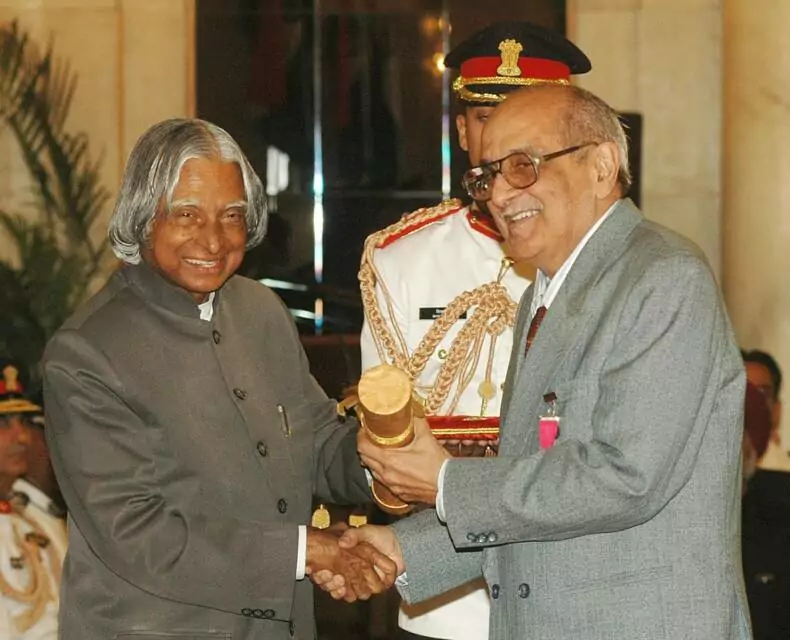Distinguished constitutional lawyer, Fali S Nariman who argue several landmark cases, including the important SC AoR Association case (which led to the collegium system) and the TMA Pai case (on the scope of minority rights under Article 30), has passed away at the age of 95.
Messages of grief poured in with Prime Minister Narendra Modi mourning the loss of ‘the most outstanding legal minds and intellectuals.’
‘He devoted his life to making justice available to common citizens. I am pained by his passing away,’ said the PM on X.
Mr Nariman was active and kept informed of major political and legal developments in the country till the end, including the recent Supreme Court judgment on electoral bonds.
Civil liberties lawyer Prashant Bhushan posted a letter by Mr Nariman which he wrote to him just five days back on the judgment.
Congratulating Bhushan, who was among the lawyers for the petitioners against the bonds, Mr Nariman wrote,
‘I am particularly impressed that the five-judge bench has held – in no uncertain terms – that ‘manifest arbitrariness’ in enacted law is now an integral part of Article 14: differing from the three judge bench decision of Jeevan Reddy J. Since Article 14 and 21 are interrelated and since Article 21 has been authoritatively re-worded by the nine judge bench (in the Privacy case), I do hope that this will enable the Supreme Court – at some point in the future – to strike down the no-bail for now provision in the recently enacted laws.’
Mr Nariman became a household name after he resigned as Additional Solicitor General to protest against the Emergency, the only law officer to have done that when a majority of the legal community had caved in to Indira Gandhi’s authoritarian regime.
Recounting his experiences after he had resigned, Mr Nariman wrote,
‘Resignation from the government may have been heroic – but this was only years later in retrospect. In Delhi people go the way the wind blows… My resignation made no impact, not even ripples, in the political waters of the time. I was simply not important enough! Later on, I remember telling my wife, ‘I wish, I sincerely wish, I was Attorney General on June 27, only for the reason that my resignation would then have had some effect’. The high commissioner of Australia Bruce Grant told me that he had met Indira Gandhi a couple of weeks after June 26, and she had expressed shock and surprise at the total lack of resistance – amongst the people – to the Emergency. She particularly mentioned to him that she was more amazed at the lack of reaction amongst the intelligentsia!’
Mr Nariman was a staunch advocate of civil rights and individual liberties, appearing in several landmark cases such as the Golaknath case, even assisting the legendary Nani Palkhivala as a junior.
The Supreme Court which had upheld Parliament’s power to amend all parts of the Constitution, including Part III related to fundamental rights, reversed its decision observing that ‘Parliament had no power to curtail fundamental rights.’
It paved the way the way to the basic doctrine, keeping a check on Parliament’s power to amend the Constitution.
Fali S Nariman was also involved in S. P. Gupta and TMA Pai Foundation which have defined constitutional norms and the course of jurisprudence over the years.
Nariman defended the right of the free press in the celebrated ‘Indian Express’ case, where the Supreme Court struck down the order of the Delhi Government threatening to demolish The Express building as ‘violative of the Constitutional right of free speech and expression.’
Perhaps an anomaly in a distinguished career was appearing for Union Carbide Corporation in the Bhopal gas tragedy case, for which he was criticized. It is a decision, it is said, that he regretted later.
In his autobiography ‘Before Memory Fades’, Nariman recounted why he returned his brief to the Gujarat Government in the Narmada rehabilitation case. He was appearing as senior counsel for the State of Gujarat in a PIL filed on behalf of tribals displaced by raising the height of the Narmada dam.
On Christians being harassed in some parts of Gujarat and the Bible being burnt, he took up the issue with the then Chief Minister of Gujarat Keshubhai Patel, but the situation worsened with churches being burnt in many parts of the state.
Fali S Nariman authored several books including ‘The State of the Nation’, ‘Before Memory Fades: An Autobiography’, ‘God Save the Hon’ble Supreme Court, ‘India’s Legal System’.
Over the last few years, he expressed concern about the rise of Hindu majoritarianism in India and the spread of coercive and punitive legislation.
He was a vocal critic of the sedition law and spoke openly against it continuing to be on the statute book.
Mr Nariman is survived by his son Rohinton Fali Nariman, a retired Supreme Court judge, daughter Anaheeta and daughter-in-law Sanaya. His wife Bapsi Nariman died in 2020.
Stay updated with all the insights.
Navigate news, 1 email day.
Subscribe to Qrius

